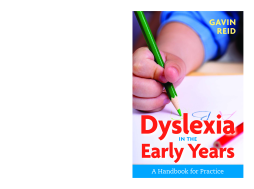
Additional Information
Book Details
Abstract
Research has shown that early identification and intervention is crucial and can in fact minimise, and may even prevent, the challenges of dyslexia from becoming too detrimental at later stages of education. This book offers both research insights and practical guidance for teachers working in Early Years settings on how to create resource materials that would be suitable for the development of children with dyslexia.
Beginning with a contextual note on the key difficulties faced by children at risk of dyslexia, the book takes the reader through the processes of identification and diagnosis, before offering ideas on how to tailor classroom materials for these students. The book's resource materials are designed to target areas such as reading, spelling, numeracy, language skills, social and emotional development, and problem solving skills.
Gavin Reid has provided a much needed text which will greatly assist practitioners in the timely identification and educational support planning for dyslexia. The clear emphases upon partnership working with parents and children's motivation are particularly relevant for the early years practitioner. With its authoritative, practical and accessible style, this book will be an invaluable resource for early years and special needs practitioners.
Kevin Woods, Professor of Educational and Child Psychology, The University of Manchester, UK
An excellent resource! Dr. Reid holds a unique ability to provide practical and necessary information with an international perspective. Beyond the first read, this book holds valuable resources for reference again and again. Dyslexia in the Early Years is a must read for parents, educators and those who support children with dyslexia.
Corey Zylstra, M.Ed. International OG/MSL Teacher Trainer and Executive Director of REACH OG Learning Centres, Canada
Gavin Reid is an international consultant and psychologist with consultancies in Canada, UK, Europe, Middle East, Asia and Australasia. He was visiting professor at the University of British Columbia in Vancouver, Canada in the Department of Education and Counselling Psychology and Special Education in 2007 and 2010. He was previously a senior lecturer at Moray House School of Education in Edinburgh. He is an ambassador for the Helen Arkell Dyslexia Centre in the UK. He lives in Edinburgh.
As the parent of a dyslexic child and a headteacher and SENCo for 17 years, I was impressed by the breadth and depth of this book. It is both practical and well researched. The emphasis on partnership with parents and providing intervention from the sound foundations of play-based early years pedagogy creates a book for practitioners, parents and those working with children who display a range of dyslexic tendencies.
Montessori International
Gavin Reid provides a wealth of information on dyslexia for parents and teachers, blending a comprehensive overview of research, pragmatic advice, lists of resources and wisdom based on many years of wide experience in the field.
Professor Steve Chinn, PhD, FRSA
It has been a very great pleasure to read and recommend Gavin Reid's new book, Dyslexia in the Early Years, a resource that should prove invaluable to teachers, researchers and parents. Gavin has a unique ability to smoothly incorporate the latest developments in both theory and practice into an approachable format for his readers, while successfully addressing some of the current controversies. A range of resources are highlighted for teachers to meet the individual and classroom needs of this age group, not only in literacy skills but also in the important wider aspects of learning, including both social and emotional well-being.
Emeritus Professor Angela Fawcett
Table of Contents
| Section Title | Page | Action | Price |
|---|---|---|---|
| Dyslexia in the Early Years – A Handbook for Practice, by Gavin Reid | 3 | ||
| Acknowledgements | 6 | ||
| Preface | 7 | ||
| Age and Stage Equivalents by Country | 10 | ||
| 1. Dyslexia, Pre-school and the Early Years - The Context | 11 | ||
| 2. Identifying Learning Needs - Early Identification | 27 | ||
| 3. Formal Tests, Screening and Links to Intervention | 40 | ||
| 4. Intervention Approaches - Meeting Individual Needs | 62 | ||
| 5. Intervention Approaches - Meeting Classroom Needs | 93 | ||
| 6. Emotional and Social Issues and Motivation | 108 | ||
| 7. Memory and Information Processing | 123 | ||
| 8. Specific Learning Difficulties | 137 | ||
| 9. Issues and Considerations | 150 | ||
| 10. Concluding Comments, Resources and Practical Strategies | 166 | ||
| Appendix: Resources Grid | 177 | ||
| Glossary of Terms | 179 | ||
| Further Resources | 183 | ||
| References | 192 | ||
| Subject Index | 201 | ||
| Author Index | 205 | ||
| About the Author | 208 | ||
| Blank Page |
